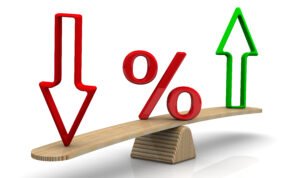
Weekly Mortgage Market Update – Rate Stability & Consumer Strength: Define the Week
This past week, mortgage rates in Raleigh, Cary, Greensboro, and the Triangle Region stayed relatively steady as strong retail sales, rising consumer spending, and firm inflation data balanced out fears of economic overheating. Mortgage-backed securities (MBS) trading saw modest gains early in the week, then flattened as inflation signals remained mixed. Though rates didn’t crack downward in a big way, buyers and refinancers got a breathing space in what continues to be a volatile bond yield environment.
Key Economic Drivers Behind Mortgage Bond Movements
3. Rate Stability in the Face of Economic Fluctuations
1. Retail Sales Surged, Suggesting Persistent Demand
On Tuesday, Retail Sales for August came in much stronger than expected—with both total retail sales and “excluding autos” numbers posting ~0.6-0.7% month-over-month gains. These figures reinforced that consumers are still spending despite inflation and interest rates, which put some upward pressure on bond yields. For mortgage markets, that meant less downward movement than some hoped, but rates managed to hold tight rather than climb aggressively.
2. Inflation Remains a Tangle of Signals
-
Import prices rose ~0.3% month-over-month, another signal that inflation inputs may be lurking.
-
The Philly Fed Prices Paid metric drifted lower than recent peaks, helping offset some of that pressure.
-
CPI data earlier in the week showed headline inflation slightly elevated, though core components held steady. The persistence of inflation expectations continues to weigh on long-term yield expectations and MBS spreads.
3. Fed Cuts Rates by 0.25%, Signals Cautious Path Ahead
The Federal Reserve lowered the federal funds rate by 0.25% midweek—its first cut in this new cycle—while signaling a measured approach to future moves. The updated dot-plot and economic projections still point to only gradual easing, reflecting the Fed’s desire to support growth without reigniting inflation. Mortgage bond investors welcomed the move
4. Labor Market and Housing Data Remain Mixed
-
Jobless claims were somewhat elevated, though not shocking, hinting at softness in the job market but not a collapse.
-
Housing Starts and Permits remained below projections, showing continued weakness in building activity. For the Triangle, where housing supply is tight, this adds to pressure on home price appreciation and buyer affordability.
Altogether, these mixed signals have kept mortgage rates in a narrow window: high enough to reflect inflation risk, low enough to preserve buyer and refinance interest.
Raleigh Mortgage Snapshot: What This Means Locally
For homebuyers and homeowners around Raleigh, the Triangle, and surrounding areas:
-
Buyers are getting some of the best affordability in nearly a year. With rates holding near mid-6% for many well-qualified borrowers, a modest budget stretch could allow access to neighborhoods or home sizes previously out of reach.
-
Refinancers—especially those with older mortgages locked in at 7-plus percent—have a window to meaningfully reduce payments. Products like VA IRRRL, FHA Streamline, and rate/term refinances are seeing more attractive spreads.
-
Move-up buyers benefit from stability: knowing that rates probably won’t fall dramatically without strong data allows for more confident decision-making.
Inventory remains tight in many markets (Wake County, southern Durham, parts of Guilford), so lower borrowing costs can shift the dynamics for who can successfully make offers.
What’s Coming Next Week: Key Reports to Watch
Next week’s economic calendar is loaded with reports that could shake up mortgage bond markets and interest rates:
| Date | Key Report | Why It Matters |
|---|---|---|
| Wednesday, Sept. 24 | Building Permits & New Home Sales (Aug) | Permits and sales gauge housing supply and demand. Strong readings could push rates up; weak ones support downward pressure. |
| Thursday, Sept. 25 | Durable Goods (Aug), Core PCE Final Q2, GDP Final Sales Q2, and Existing Home Sales (Aug) | These will test inflation control and growth. Especially Core PCE & GDP Final Sales — data the Fed watches closely. |
| Friday, Sept. 26 | Core PCE m/m & y/y, Personal Income, Consumption, Sentiment Indicators | Inflation & income trends; consumer sentiment often signals which direction rates might move next. |
Also worth paying attention to: speeches from Fed officials (Daly, Goolsbee, Bowman, etc.), which could provide guidance on timing for rate cuts or inflation risks.
Should You Lock Rates Now or Wait?
Because mortgage rates are influenced by both current data and expectations of future Fed actions, timing is everything. Historically, mortgage rates tend to bottom out before or just as rate cuts are being priced in widely—and then may drift upward if economic data surprises to the upside.
For Raleigh and Triangle borrowers, here are strategic takeaways:
-
If you’re buying soon or need to close in the next few months, locking in a rate now may protect you against data-driven increases next week.
-
If you’re considering refinancing (VA IRRRL, FHA Streamline, or Conventional), doing preliminary cost estimates now helps, especially for those stuck at higher rates from earlier in 2025.
-
If you can tolerate a float, check for rate lock options that allow a float-down in case of favorable movement—but don’t assume rates will decline significantly without strong supporting inflation or growth data.
Final Thoughts for Triangle Homebuyers & Homeowners
This week’s mortgage bond trading was shaped by strong retail data, inflation currents, and Fed signals—all of which kept rates from climbing aggressively even as some economic strength showed up. As a result, rates held within a favorable range for borrowers in Raleigh, Cary, Greensboro, and across the Triangle.
However, the upcoming economic releases (Core PCE, GDP, durable goods, home sales) and Fed commentary have the potential to tilt the scales. If inflation surprises higher, yields could push mortgage rates up. On the flip side, softer inflation or weaker growth could extend or deepen the rate advantage.
Need help making a decision? At Certified Home Loans Raleigh, we work with homebuyers and refinancing homeowners (VA IRRRL, FHA Streamline, Conventional) across Wake, Durham, Guilford, and beyond. Reach out for a personal rate evaluation so you can lock when it makes sense, or float with an exit plan to make your home loan work for your budget and timing.





